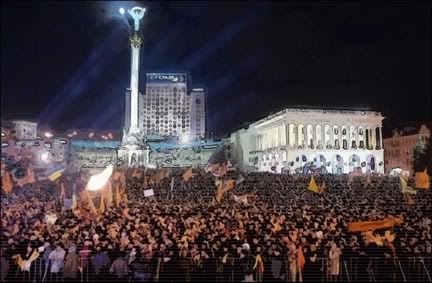Adam Larson
Caustic Logic / Guerillas Without Guns
Western access to the "Eurasian Balkans" of Central Asia relied on the post-Cold War dissolution of Soviet power that opened the area to outside influence – and such a situation was not necessarily permanent. Brzezinski noted in 1997 early fears of a new convergence of native Eurasian power: “if the middle space [Russia and former USSR] rebuffs the West, becomes an assertive single entity, and either gains control over the South [Central Asia] or forms an alliance with the major Eastern actor [China], then America's primacy in Eurasia shrinks dramatically.” Indeed, the seeds for all these possibilities were already sown as he wrote the words.
Perhaps the most interesting of these started as the quaint-sounding “Shanghai Five” organizations that was formed in 1996 with signatory nations China, Russia, Kazakhstan, Kyrgyzstan, and Tajikistan. With official languages of Russian and Chinese, they worked to resolve border and disarmament disputes between themselves, apparently a regional house-cleaning in preparation for a more muscular campaign.
In their sixth annual meeting, June 2001 in Shanghai, sixth member Uzbekistan was admitted and the group re-named itself the Shanghai Cooperation Organization (SCO), with stated aims of fighting ethnic and religious militancy and promoting trade and foreign investment. Gradually in the years since then, the SCO also came to be seen as an alternative to US power in Central Asia; by the middle of 2005 its platform was broad enough to entice Mongolia, Iran, Pakistan, and India to sign on as observer states and consider joining (see map). Obviously the possibility of membership for any of these states is loaded with deep implications for the existing world system, a hope for many and a fear for others that has underpinned events in Eurasia in the years since.
 Shanghai Cooperation Organization: member states and observer states. Note the total domination of Eurasia this could lead to.
Shanghai Cooperation Organization: member states and observer states. Note the total domination of Eurasia this could lead to. From the beginning, the member governments of the SCO had been focused on collective security, counter-terrorism work, and anti-narcotics operations. They thus shared a concern over the lawless state in the Taliban’s Afghanistan, rife with civil war and oozing out a steady stream of Islamic fundamentalism, trained terrorists, and opium. The training camps attributed widely to bin Laden’s al Qaeda were primarily meant to usher in Islamist governments in regional states and areas like Xinjiang, Chechnya, and Uzbekistan, so this was clearly a paramount regional concern. The Taliban’s prime sponsor, Pakistan, was nowhere near the SCO at the time, but India, Iran, and Russia had all teamed up to support the Northern Alliance against the Taliban however they could. The Alliance was offered safe haven in Tajikistan to bolster its position on Afghanistan’s northern fringe. After 9/11 and the commencement of Washington’s “War on Terror,” the SCO issued a sort of ‘told-you-so’ statement on January 7 2002:
“As close neighbors of Afghanistan we had for an extended time been directly subjected to the terrorist and narco threats emanating from its territory long before the events of September 11 and had repeatedly warned the international community of the danger posed by those threats. That was why the SCO member states became actively involved in the anti-terrorist coalition and took measures to further intensify the SCO's work on the anti-terrorist front.” [3]
Sources:
[1] Brzezinski. "The Grand Chessboard." 1997. Page 124.
[2] Fang, Bay. “The Great Energy Game.” US News and World Report. Vol 141, no. 9. September 11 2006. p 60-62.
[3] Joint Statement by the Ministers of Foreign Affairs of the Member States of the Shanghai Cooperation Organization (Beijing, January 7, 2002) Ministry of Foreign Affairs of the Russian Federation. http://www.shaps.hawaii.edu/fp/russia/sco_3_20020107.html


No comments:
Post a Comment